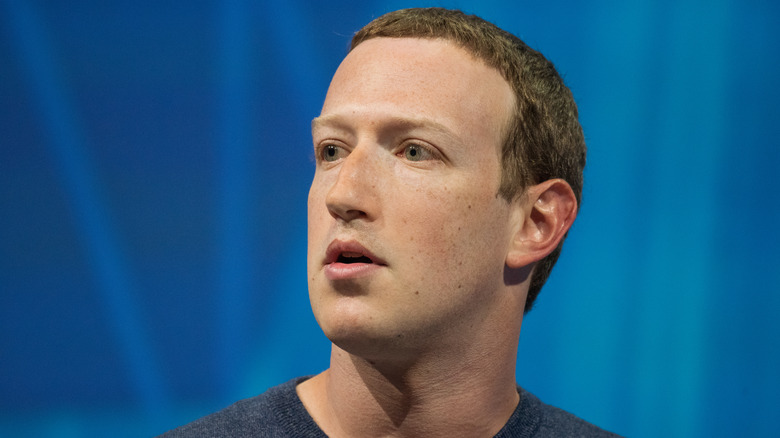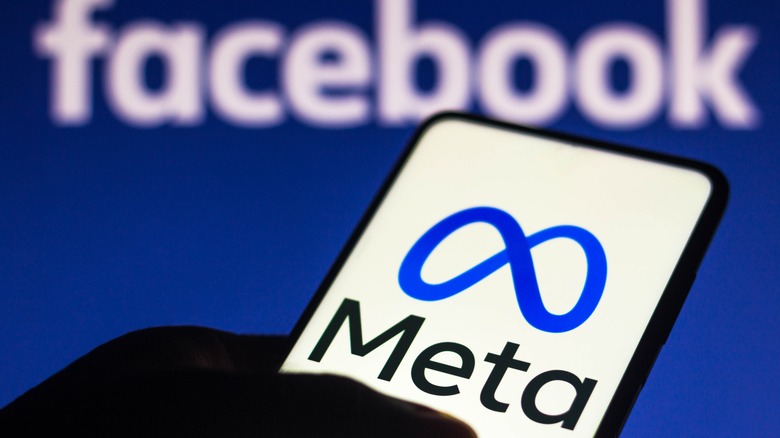How Mark Zuckerberg Just Lost Over Half Of His Wealth
With costs rising, wages stagnant, and global uncertainty delaying any strong recoveries, people are having a rough time financially at the moment. In the world of the financial elite, where billions are made and lost from day to day, some people are feeling the sting, too. Mark Zuckerberg, one of the better-known billionaires and a regular on the top 10 list of the world's richest, has managed to lose half of his net worth since the first of January. While you're unlikely to see Zuckerberg skipping a mortgage payment or lining up at a food bank, he is still an astonishing $70 billion down since December 2021.
Zuckerberg is one of the most recognizable names in tech. The Facebook founder has been the subject of documentaries, Hollywood movies, and high-profile hearings in front of the United States Senate. He also plays a very active role in the companies he owns, having a major influence on the direction of the companies and personally presenting his main company Meta's annual conference. Zuckerberg's influence on the direction his companies take may have directly caused his current situation.
Facebook has had a rough year
Most of Zuckerberg's net worth is tied up in stock, and his main holding is the company Meta — which itself owns Facebook, the company formerly known as Oculus, and several other high-profile businesses. Meta's share price has taken a major beating after peaking at the end of last year, and whatever happens to Meta is clearly reflected in its owner's bank balance. This isn't unique to Meta or Zuckerberg, and doesn't always yield negative results. Although he has stakes in several companies, Elon Musk's net worth is heavily linked to how electric vehicle manufacturer Tesla is doing at the time. A Tesla stock surge is what made Musk the world's richest man, and a dip in its share price could be enough to see Musk tumble back down the list.
Facebook's parent company changed its name to Meta following its annual conference last year, and uncertainty around the content of that conference — coupled with declines across the entire tech market — has led to the company's share price going into freefall. According to CNBC, the company has lost 60% of its value, having experienced a further 14% dip last week. The plummet in share price has left stock in the company costing only a few cents more per share than it did during the dip we saw at the start of the 2020 coronavirus pandemic. The decline could have been caused by a few things, including the tech market as a whole being overvalued and correcting itself. However the fact the dip started following Meta's 2020 conference and continued steadily since suggests shareholders aren't happy with the direction the company is heading in.
Backing the metaverse is a big risk
In February, the company admitted it had lost over $10 billion in income on its VR project with the final quarter of 2021 being its worst financial period overall. Other parts of the company, such as Facebook's advertising services, are incredibly profitable. That money isn't just going on headsets and games; it's actually all part of Zuckerberg's attempt to lay the foundations of the metaverse, which he sees as the next version of the internet. To put it simply, Zuckerberg sees the metaverse as an internet you can walk around, hang out, work, and attend events in. Your physical presence in that world is made possible through the use of a VR headset.
Not everyone is as sold on the concept as the Facebook founder. The financial revelation prompted a backlash that Meta's board has been trying to mitigate ever since. In June, Meta's flagship headset got a major price increase, ith the base model going from just under $300 to just under $400. There had long been suggestions that Meta had been selling its hardware at a loss or break even in an attempt to dominate the market. The problems don't just exist on the hardware front either. In the last few months, Meta unveiled more of the company's "HorizonWorlds" VR social platform and was panned for how bad the whole thing looked.
All of the evidence suggests Zuckerberg's VR gamble, which formed a core part of Meta Connect 2021 and is likely to feature heavily in the 2022 event, is what is putting shareholders off. But despite things looking bleak in the short term, Zuckerberg's backing of the metaverse may pay off massively in the future.
Zuckerberg's gamble may pay off long term
Despite the financial uncertainty, Zuckerberg may actually be correct in backing the metaverse concept — and if he is right, then the payoff will be huge. Although the concept itself has been repeatedly billed as open source and Meta has tried to get other major companies involved from the start, it would still have a leading role and potentially make an incredible profit if the metaverse takes off. In terms of hardware, Meta seems to have achieved what it set out to do despite what the losses look like on paper. The Quest 2 is the world's most popular VR headset by a long way and has introduced a wide range of people to what was once an extremely niche medium.
Zuckerberg's vision sees people entering the metaverse to work, play, and hang out; it also involves people paying for digital versions of everyday items, like chairs and televisions. If the metaverse ends up being anywhere near what Zuckerberg has pitched, and his company makes even a tiny fraction of the amount of money that will be spent on it, then Meta's gamble will pay off massively. As for the short term, a lot will hinge on the reaction to Meta's upcoming 2022 Connect conference — including the hype that comes with its latest VR/AR headset.



